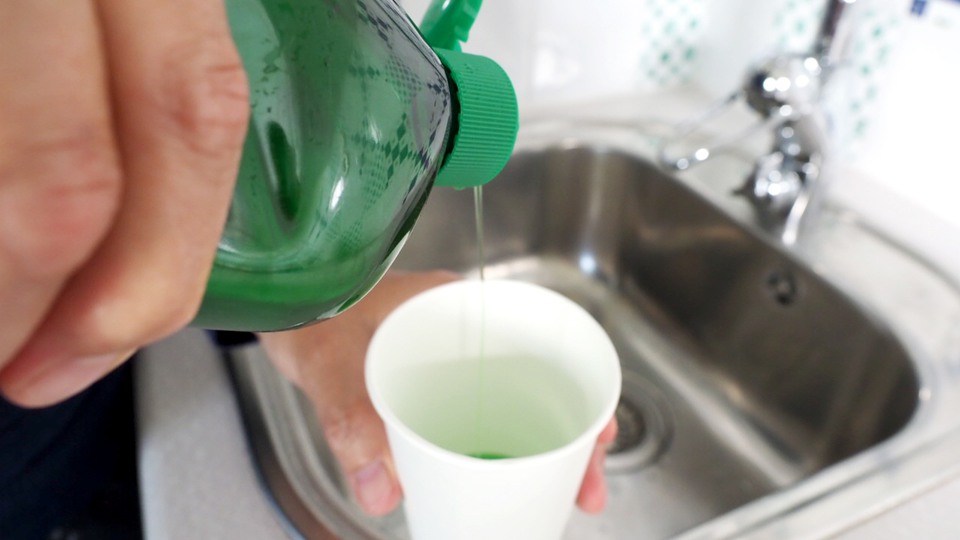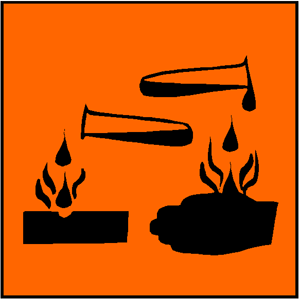
There are many good alternatives to unclog drains.
Drain cleaners
Content:
Every year, both children and adults are severely injured from corrosive drain cleaners. To reduce accidents, private individuals will be required from 1 January 2025 to apply for permits to purchase and use these products. It is best to use other methods to keep drains clean.
Advice to avoid blockages
Clogs in pipes are formed through the accumulation of hair, grease and food scraps. There are several ways to avoid this.
- Wipe grease out of frying pans before you wash them. Throw the grease away.
- If you have a small amount of oil, you can pour it into a container, close it off, and discard it in the rubbish bin.
- Some municipalities collect grease as waste. Let the grease or oil cool down first. Then pour it into a bottle using a funnel. When the bottle is full, you can deposit it at a waste recycling facility.
- Use a fine-mesh strainer in the sink.
- Pour hot water into the drain from time to time.
- Use a hair filter in the shower floor drain and over the bathtub drain.
- Remove any hair that ends up in the sink.
- Empty razors and shavers in the waste bin.
- Prevent clogs by regularly using biological drain cleaners.
If you still get a blockage in the drain
Corrosive drain cleaners cause severe injuries. This is why private individuals must have permits to purchase and use them starting 1 January 2025. There are many good alternatives to unclog drains.
- Use a plunger or drain rod/cable (snake) to remove the blockage.
- Clean the water trap under the sink.
- For more difficult blockages, you can hire a plumber or a flushing truck.
- If you want to use a drain cleaner, avoid corrosive ones. Here is the hazard symbol found on corrosive drain cleaners.
- Always read the instructions carefully before you open and use a drain cleaner to prevent injury to yourself or others.
- Keep the drain cleaner in the package until you need to use it. Do not place it in other bottles or containers for storage. Do not place it in a glass or cup when you are going to use it.
- Store drain cleaners high up so that children cannot reach them.
- Remember to screw the cap back on tightly after you have used the product.
- Do not trust the so-called childproof caps. Children can open them – it just takes more time.
- In case of an accident with a corrosive drain cleaner, see the Swedish Poisons Information Centre’s advice (Link to another website).
 External link.
External link.
Corrosive drain cleaners can cause severe injuries
Corrosive drain cleaners can quickly cause severe burns in the mouth and oesophagus, in the eyes and on the skin. Some injuries can lead to lifelong suffering. Accidents with corrosive drain cleaners have increased in recent years, The Swedish Chemicals Agency has therefore decided that non-professional users may only purchase and use corrosive drain cleaners if they have a permit. The permit requirement applies from 1 January 2025, and it is the County Administrative Board in your county that can grant permits.
Because the permit requirement applies for both the purchase and use of corrosive drain cleaners, there is no point in stocking up on them. The offence for using corrosive drain cleaners without a permit after 1 January 2025 is considered as unauthorised environmental activity, for which the penalty is fines or imprisonment for up to two years.
Read frequently asked questions and answers about corrosive drain cleaners
What does the hazard symbol look like?

Highly corrosive drain cleaners are labelled with the corrosive hazard symbol and have the warning text ‘Causes severe burns to skin and eyes.

Older corrosive drain cleaners may be labelled with this hazard symbol in accordance with the Swedish Chemicals Agency’s regulations.
A product labelled as corrosive can cause severe injuries if you get it on your skin, in your eyes or in your mouth. These products may include drain cleaners, decalcifiers, oven cleaners or ammonia. Some products can even corrode metal. If you use corrosive products, you must always wear gloves and safety glasses to protect yourself. Remember that corrosive products must always be stored out of the reach of children.
Read more about labelling and hazard symbols.
